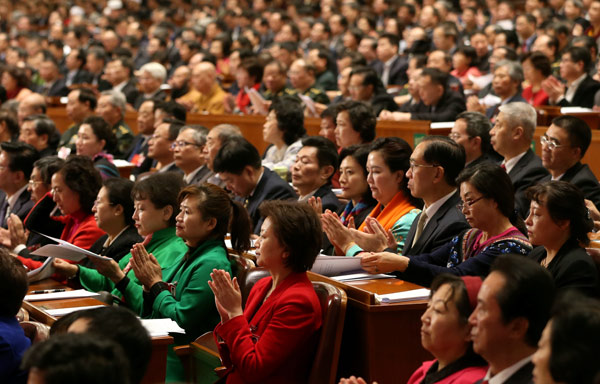 |
|
CPPCC members finish their annual session at the Great Hall of the People in Beijing on Monday. [Photo by Zou Hong/China Daily] |
China's political advisers finished their annual gathering in Beijing on Monday, having submitted more than 5,375 proposals to the central government, 42 percent of which focused on economic development.
The proposals included proceeding with supply-side economic reform, encouraging entrepreneurship and innovation, reducing the tax burden on enterprises, improving the quality of consumer goods and the service industry, and speeding up the implementation of the Free Trade Area strategy and the development of e-commerce in rural areas.
The proposals also focused on themes including politics, culture, ecological civilization, and protecting and improving people's livelihoods, a report issued by the proposal committee of the Chinese People's Political Consultative Conference National Committee said on Monday, as the 12th National Committee of the CPPCC closed its fourth plenary session.
In all, 1,972 members of the CPPCC National Committee-89.1 percent of the total-submitted proposals.
"It is our responsibility to submit valuable suggestions relating to the theme of building a moderately prosperous society," said Yu Zhengsheng, chairman of the CPPCC National Committee. "All members of the CPPCC should fulfill their duties by focusing on development during the 13th Five-Year-Plan (2016-20) period."
Yu called on members to provide suggestions on major issues of economic and social development and difficult issues of comprehensively deepening reform based on in-depth investigation, group discussion and effective supervision.
Ge Jianxiong, a nine-year member of the CPPCC standing committee, said he was impressed most by the down-to-earth and active attitude of the advisers.
"As a political advisory body, the work of the CPPCC has targeted real problems in the past years. Instead of going around those problems, the CPPCC has sought to find solutions for those problems," said Ge.
The members submitted most of their proposals during the two sessions. But there are also other opportunities for them to submit advice, for example during the bi-weekly consultation sessions of the CPPCC, which were restored in 2013.
The sessions invite members from various fields and backgrounds-mainly from non-Communist parties or those with no party affiliation-to discuss and propose solutions to practical problems, providing a platform for mainly non-Communist parties to take part in the political advisory process.
Hao Zhensheng, a political adviser and former head of the Chinese Academy of Press and Publication, said the CPPCC has helped to solve practical problems, but more transparency is needed in how government agencies have absorbed or implemented those suggestions.
"The public has little understanding of how the CPPCC has promoted China's development. I have to say, I don't know much either, as a CPPCC member," he said. "There should be a platform for the release of information to the public."